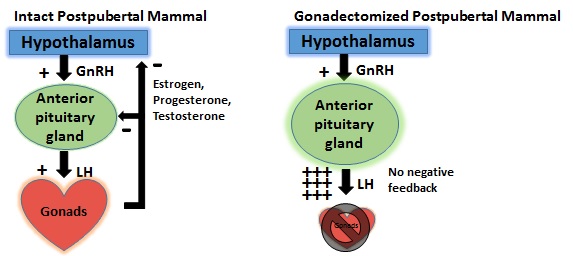Spaying or neutering dogs before they reach puberty is related to an increase in some serious health disorders. Research over the past decade has revealed a growing list of ailments that are more common in dogs that received gonadectomy (removal of the sex organs). Health issues range from incontinence and hypothyroidism to cruciate ligament rupture and cancers (including hemangiosarcoma and lymphoma). So, while it is becoming more widely known that gonadectomy may carry significant risks as a method of sterilization – it was unclear exactly why the loss of natural sex hormones causes health problems throughout the body.
Dr. Michelle Kutzler, a veterinarian who specializes in reproduction at Oregon State University, has been trying to answer that question. Dr. Kutzler is a pioneering researcher studying the implications of hormone loss in dogs. She is also a proponent of sterilization methods that do not disrupt natural hormones, such as ovary-sparing spay or vasectomy. Dr. Kutzler and her team have been studying luteinizing hormone (LH) as a possible culprit for the negative health effects of prepubertal spay and neuter.
To understand why LH might be part of the puzzle, it is important to review what happens when dogs receive a gonadectomy. Estrogen, progesterone and testosterone are hormones produced mainly in the sex organs. Normally in a mature intact dog, the brain structure called the hypothalamus stimulates the pituitary gland to release LH. It travels throughout the body and stimulates the sex organs to produce steroid hormones (estrogen/progesterone in females or testosterone in males). When the sex hormones are high enough, it tells the hypothalamus and pituitary to stop releasing LH, creating a negative feedback loop. The problem with LH occurs after spay and neuter, which removes the sex organs and the steroid hormones they produce. There is no longer a message to the brain to stop releasing LH. In spayed and neutered dogs, LH levels can be quite high.

As outlined in a recently published review paper, Dr. Kutzler has found LH receptors throughout the body, indicating that high LH levels may be the mechanism connecting a lack of natural hormones from gonadectomy to negative health outcomes. Her new publication covers the status of our knowledge about the long-term health problems and LH, and suggests new studies to clarify the role of LH. Reducing the high levels of LH may also be helpful in treating diseases like cancer or thyroid disease in spayed or neutered dogs.
If you weren’t aware of the health implications of canine spay and neuter, see our webpages for a review of the data and details on hormone-preserving sterilization methods. You can also find a list of veterinarians who offer alternatives to spay and neuter, as well as information on hormone restoration in dogs that have already undergone gonadectomy.



